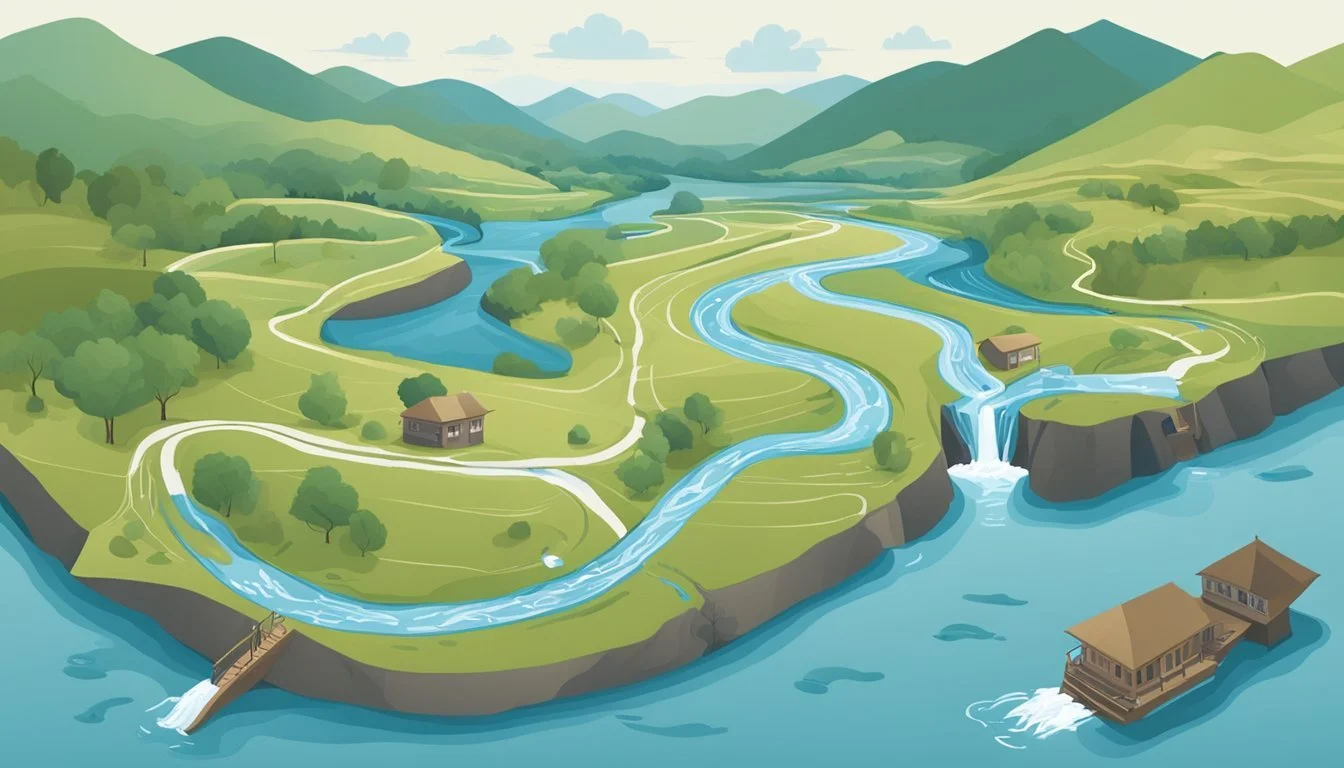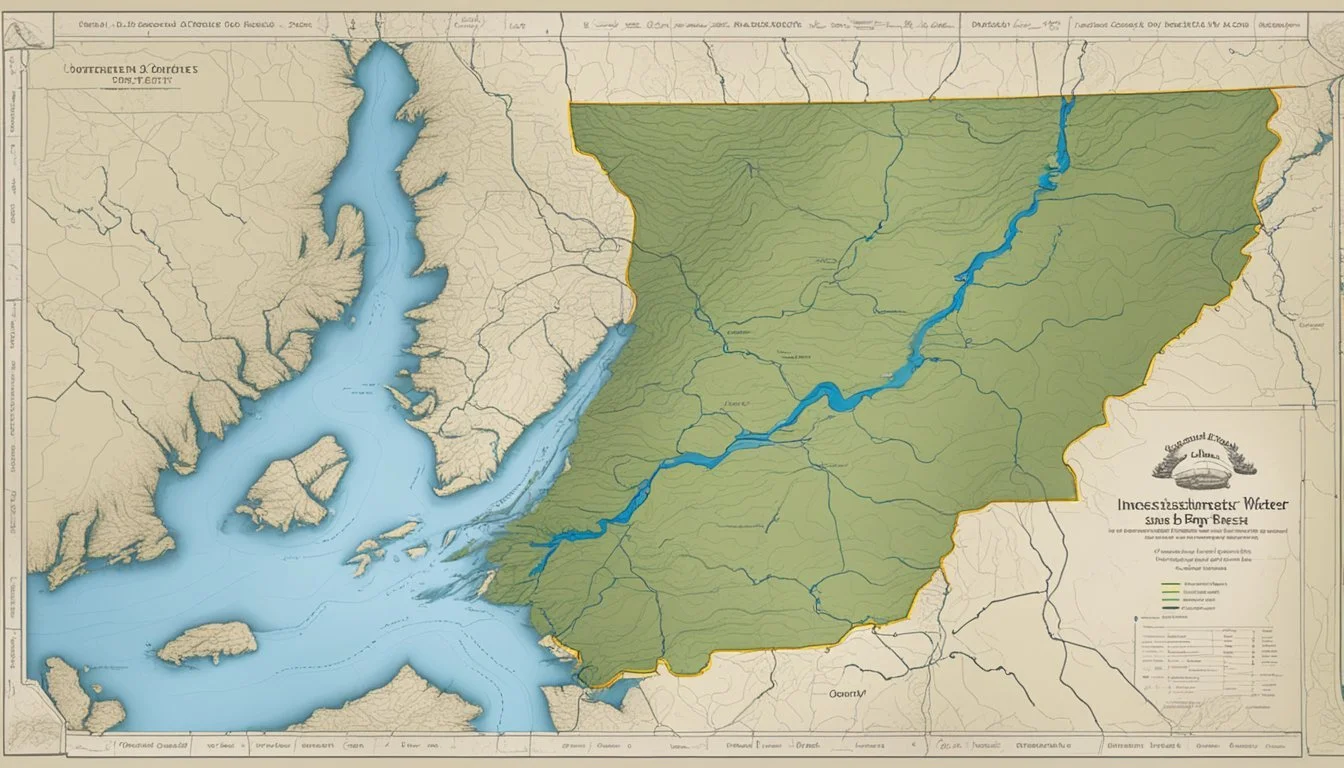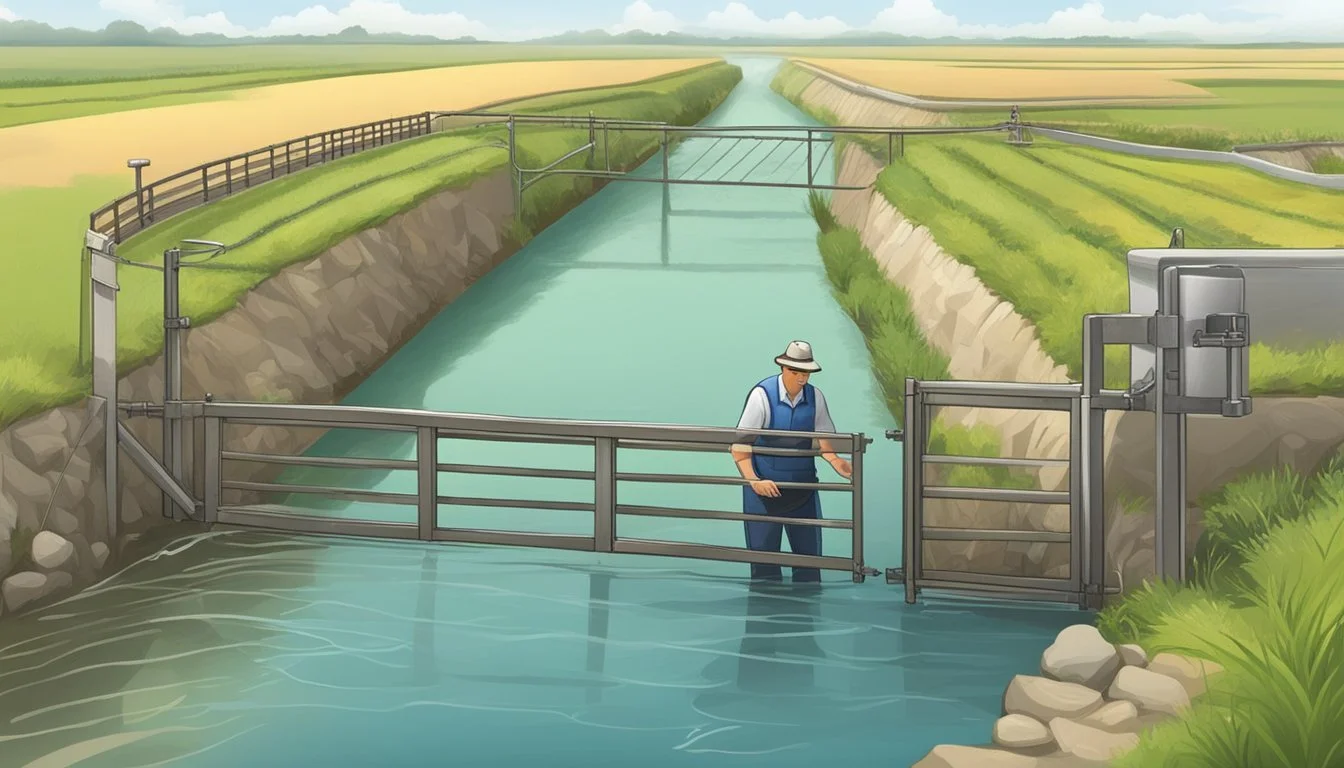Water Rights in Georgia
Navigating Policies and Ownership Challenges
Water rights are a critical aspect of property law in Georgia, reflecting the importance of water to both individuals and the broader community. Under Georgia law, the owner of land through which water runs has the ownership of the running water. However, this ownership comes with certain restrictions; for instance, a landowner cannot divert water in a way that would hinder the rights of downstream owners. These provisions highlight the balance of private property rights with the need for communal access and stewardship of water resources.
The legal framework governing water rights in Georgia addresses various issues, from the rights of landowners adjacent to nonnavigable streams to the legitimate use and enjoyment of water bodies. For example, if a stream is non-navigable and it serves as the boundary between two properties, each landowner typically has control over their half, extending to the thread, or the center, of the stream. Yet, these rights must be exercised within the bounds of legislative restrictions and respect for neighboring landowners' rights.
Given the complexity and importance of water rights in the state, conflicts over these issues can often arise. These conflicts may involve questions of access, usage, and environmental impact, each necessitating careful consideration to ensure fair and legal resolution in accordance with state statutes and existing precedents.
Historical Overview of Water Rights in Georgia
Georgia's water rights have been shaped by a mixture of statutory law and common law principles over time, reflecting the state's evolving needs and legal interpretations.
The Evolution of Water Law in Georgia
Georgia's water law is rooted in English common law but has adapted to local conditions and needs. In the early 19th century, water rights were governed by riparian principles, wherein landowners who bordered a water body had the right to make reasonable use of it. This system worked well when water was abundant and conflicts were rare. Over time, as demand for water increased, Georgia adopted the regulated riparian model, which still honors the rights of landowners but also requires reasonable use to be determined in light of all other competing uses.
The state's approach to water rights evolved significantly in 2013 when the Water Stewardship Act was passed. This legislation represented a major step forward in Georgia's water conservation efforts, calling for more efficient water use and the protection of water resources for future generations.
Common Law Influence on Georgia's Water Rights
Common law has historically been influential in shaping Georgia's approach to water rights. This influence is visibly reflected in the concept of riparian rights, which remains a foundation of Georgia water law. While statutory adjustments have been made, the principles of common law are still present in contemporary policy and legal decisions concerning the allocation and use of water resources.
Georgia law acknowledges the significance of water as a precious resource, which has led to a careful balance between the traditional common law doctrines and the requirements of a growing population and economy.
Legal Framework Governing Water Rights
Georgia's water rights are primarily based on the riparian rights doctrine, which is complemented by the reasonable use provision. Statutory laws and regulations further influence these doctrines to address modern water use challenges.
Riparian Rights Doctrine
In Georgia, water rights are intrinsically linked to land ownership, operating under the riparian rights doctrine. Individuals who own property adjacent to a watercourse have the legal entitlement to make use of the water flowing through their land. However, this use is bound by certain restrictions to prevent interference with the parallel rights of other landowners.
Reasonable Use Provision
The reasonable use provision is a critical component of Georgia water law, ensuring that the exercise of riparian rights does not unduly harm others. It permits landowners to use water for personal and domestic purposes, irrigation, manufacturing, and other beneficial uses provided they do not significantly alter the watercourse or detrimentally affect downstream users.
Statutory Modifications and Regulations
Statutory modifications and regulations shape the scope of water rights in Georgia. These statutes address issues beyond the traditional riparian rights framework, integrating concepts from environmental law to safeguard ecological resources. They govern water withdrawals and seek to balance human needs with environmental protection, applying a nuanced approach to water law and rights in a modern context.
Georgia's Water Use and Conservation
Georgia's management of water resources emphasizes both usage and conservation, reflecting the state's commitment to sustainably balance the needs of its residents, industries, and agricultural sectors. Effective strategies are deployed to ensure the long-term availability of water, particularly in the face of periodic droughts and a growing population.
Agricultural Water Management
The agricultural sector in Georgia implements methods to use water efficiently, addressing both quantity and quality of water resources. The Georgia Water Stewardship Act enforces regulations that ensure farmers employ practices to minimize water loss and maintain water supplies, such as auditing water usage and implementing modern irrigation technologies.
Required Actions:
Completion of annual water loss audits for public water systems serving 3,000 people or more.
Submission of these audits to the Georgia Environmental Protection Division (GAEPD) within a specified timeframe.
Industrial and Municipal Water Utilization
Industries and municipalities in Georgia abide by policies to regulate usage, especially for drinking water and local services. The Environmental Protection Division mandates permitted water systems to allow outdoor watering strictly between 4 p.m. and 10 a.m. to reduce evaporation and waste. This time-restricted watering is an integral part of managing the water supply, particularly during drought conditions.
Daily Outdoor Watering Timeframe:
Permitted between 4 p.m. and 10 a.m.
Water Conservation Initiatives
Georgia is proactive in its water conservation initiatives. The Georgia Conservancy plays a critical role in advocating for conservation measures, focusing not only on the immediate needs but also long-term environmental impact. Efforts are multi-faceted, ranging from educational programs to investment in water-efficient infrastructure.
Conservation Measures:
Protection of water quality in rivers, streams, wetlands, aquifers, and estuaries.
Long-term economic and quality-of-life improvements through sustainable water management.
Interstate Water Disputes and Compacts
Interstate water compacts are pivotal tools for addressing water allocation among states. Georgia has been involved in significant disputes with neighboring states, leading to a series of complex legal negotiations and decisions, particularly concerning two major river basins.
The Apalachicola-Chattahoochee-Flint (ACF) Compact
The ACF Compact involves the management of water resources shared between Georgia, Florida, and Alabama. Disputes have persisted over the equitable distribution of water flowing through these river basins. In 1997, Congress endorsed compacts for the ACF basin, mandating the states to develop allocation formulas for fair water sharing. The region has experienced intense 'water wars', with arguments focusing on both water volume and consumption rates that affect the river system's health and the states' economic interests.
The Alabama-Coosa-Tallapoosa (ACT) Compact
Parallel to the ACF Compact, the ACT Compact engages Georgia and Alabama in management of the Alabama-Coosa-Tallapoosa river basin. Similar to the ACF, this compact's goal is to agree on an apportioning strategy that meets the needs of both states. The compacts are meant to preempt lengthy and costly litigation, fostering cooperation through negotiated agreements.
Recent Litigations and Judicial Decisions
Litigations involving the ACF basin culminated in a significant Supreme Court ruling in 2021, where Georgia secured a victory over Florida. This outcome upheld Georgia's stance on water consumption from the basin. The U.S. Supreme Court found that Florida failed to demonstrate clear and significant harm, as well as the redressability of potential damages, reaffirming Georgia's water use as equitable and reasonable.
In these interstate disputes, the role of judicial decisions is crucial, as they not only interpret but also set precedents on how interstate water compacts are to be implemented and enforced. Evidence presented in court plays a significant role in shaping the rulings which determine regional water policies and the future of interstate water cooperation.
Impact of Water Rights and Regulation
Water rights and regulations in Georgia have profound implications on agriculture, industry, and the environment. These laws dictate how water resources are allocated and managed, shaping the state's landscape in various capacities.
Effects on Agriculture and Farmers
In Georgia, agriculture is a significant industry, relying heavily on both surface and groundwater for irrigation. Water rights have a critical role in ensuring that farmers have the necessary access to water for crops. However, during periods of drought, regulations may limit water usage, impacting crop yield. For instance, the Flint River provides vital irrigation but is also prone to dry spells, prompting regulatory measures to balance farmers' needs with conservation efforts.
Irrigation Needs: Priority for cropland watering, particularly during drought.
Regulatory Measures: Allocation adjustments in response to water scarcity.
Influence on Industry and Urban Development
The bustling metropolis of Metro Atlanta and its industry are expanding rapidly, escalating demands on water supply. Strict water regulations ensure a fair distribution between urban areas and other users. Industries like manufacturing and energy generation often require substantial water quantities and must comply with regulations that prevent water pollution and mandate sustainable use.
Water Availability: Managed to support industrial growth without compromising other necessities.
Pollution & Waste: Regulations enforce treatment and proper disposal to maintain water quality.
Environmental Concerns and Ecosystem Preservation
Environmental regulations in Georgia safeguard natural waterways, swamps, habitats, and species like those found in Apalachicola Bay, home to valuable oyster fisheries. The construction of dams and the diversion of water come with ecological implications, potentially disrupting swamps and fish habitats. Regulations balance human needs with those of ecosystems, aiming for sustainable management of Georgia's precious water resources.
Habitat Protection: Regulations prevent undue harm to ecosystems.
Sustainable Practice: Encourages water conservation and responsible environmental stewardship.
Stakeholder Involvement and Governance
In Georgia, water rights and governance involve a dynamic interplay between various stakeholders, including conservation districts, environmental groups, and governmental entities. Effective engagement and policy development are crucial for the management of the state's water resources.
Role of the Georgia Association of Conservation Districts
The Georgia Association of Conservation Districts (GACD) plays a pivotal role in water governance within the state. They are instrumental in advocating for sustainable water management practices and facilitating the involvement of local stakeholders. The association works directly with farmers and industries to implement conservation strategies that protect water resources. Their initiatives aim to balance economic needs with environmental sustainability, reflecting a commitment to stewardship of Georgia's water systems.
Engagement of Environmental Groups and Experts
Environmental groups and experts are actively involved in Georgia's water governance through various means, such as providing scientific expertise and engaging in public discourse. Entities like the Georgia Water Coalition work alongside key individuals such as Mark Masters, who is known for his research and expertise in environmental law. These groups ensure that industries operating within Georgia, including those with significant water demands like agriculture, adhere to practices that safeguard water quality and availability.
Governmental Response and Policy Development
The governmental response to water governance in Georgia is shaped by the actions and recommendations of conservation districts and environmental experts. Policies are developed in accordance with environmental laws while considering the interests of industries that rely heavily on water. Governors and policymakers collaborate with entities like the GACD and experts to frame water legislation that supports conservation efforts across the state, including the implications of such policies in Kansas, which has faced similar water governance challenges. This collaborative approach seeks to create a transparent, equitable framework for water resource management.
Frequently Asked Questions
This section provides clear answers to common inquiries regarding water rights and related legalities in Georgia, ensuring landowners understand their entitlements and responsibilities.
What determines who owns the land beneath navigable waterways in Georgia?
In Georgia, the state holds title to the beds of navigable waterways, which are held in trust for the public use. The Georgia Code § 44-8-1 clarifies that while property owners may possess the land adjacent to these waterways, the land beneath the water itself is not privately owned.
What are the legalities concerning water runoff onto neighboring properties in Georgia?
Georgia follows the "reasonable use" rule for surface water runoff, allowing landowners to make reasonable use of their property in a manner that may alter the natural flow of surface water, but not to the point where it causes unnecessary harm to neighboring properties.
How does pond ownership affect water rights on a property in Georgia?
Pond ownership in Georgia provides the property owner with certain rights to the use of the water within their land boundaries, as long as the pond is not fed by a navigable waterway, which would be subject to state jurisdiction and public trust.
What are the specific fishing rights for property owners in Georgia?
Property owners in Georgia generally have the right to fish in bodies of water that are entirely on their property. However, for water bodies where fish populations are considered state property, like navigable waters, owners must comply with state fishing regulations.
How do riparian rights function in Georgia for landowners adjacent to water bodies?
Riparian rights in Georgia grant landowners whose property abuts a body of water the right to make reasonable use of the water. This includes domestic purposes and irrigation, provided they do not significantly alter the flow or quality of water for downstream users.
Are property owners responsible for the maintenance of creeks running through their land in Georgia?
Property owners in Georgia are not typically required to maintain the natural state of creeks running through their land, although they may have responsibilities to avoid polluting and must ensure their use does not negatively affect downstream or adjacent properties.






